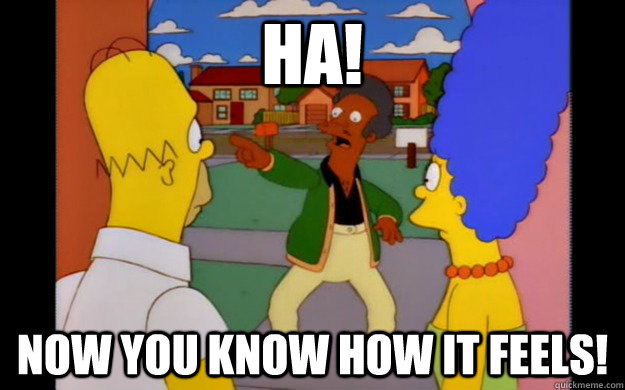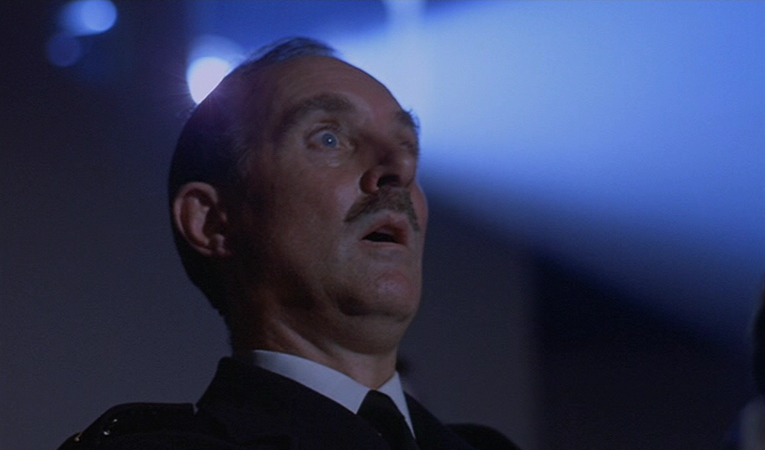A shit this film just has to much ground to cover.
This is the sort of observations that makes me think I should have rewatched the movie before typing up that post. Also, that drunk sings quite good, actually.
When the drunk started talking about "men on the moon" I went, "Seeing as this is a Kubrick film, I bet there are a thousand conspiracy theories online about that sentence".

Also to add towards the focus on societal themes, the writer says that his wife was a "victim of the modern age." He doesn't just see her as a victim of some random act of hooliganism, he sees her as a victim of a societal trend and culture.
Yeah. I like how his mum just breaks down and starts crying whenever things get stressful -- instead of actually dealing with the problem.
And when he returns from prison -- they offer no assisstance whatsoever. They just want him out of their life and live with Joe instead. The "excuses" they offer are seriously lame. Man Joe must be a swell guy. They must see Joe just as the Vampires saw Stu in What We Do in the Shadows. Remeber Stu!? Ah that was a right old bugger it was. Real horrorshow!
It's funny how Mr Deltoid say's:
Mr. Diltoid "We've been studying the problem for years [teenage violence]. You got a good home. Loving parents. Not to bad of a brain." It's a masterclass example of missing the point, seeing as he and virtually every other authority figure in the film are corrupt or degenerate themselves. Alex is no outliner, he reflects mainstream society pretty well, obsessed with violence and humiliations.
And calling Alex's parents loving is a bit of a stretch.
See here Deer-Man, I think part of the point is that "no one is giving guidence".
When Alex is released from jail -- not a single person wants to help him rehabilitate. Everyone instead just wants to take their vengence on him. This is indicative of how this society thinks. Guidence is just a foregin concept to them, not something they think about. The entire culture is just permeated with violence, even before Alex becomes conditioned.
Had Alex not arrived by accident at the writers house -- he would have undoubtedly succumbed to either the elements of the abuse of strangers. So ironically, meeting the writer (a political enemy of the society and therefore not like them normally) again might have actually saved him.

The Priest has always been a bit of an odd duck for me. Early on, he tells Alex "I know of the urges that can trouble young men deprived of the society of women". In that moment, it's like Kubrick is setting us up for some old fashioned altar-boy buggery, but nothing comes of it, and instead the clergyman actually seems to be the moral heart of the story.
That early line is just such a curveball.
French Connection 8/10 -- a certified great
A Clockwork Orange 9.5/10 -- real horrorshow!
But hey, at least Fiddler on the Roof didn't win

O-face!
The question of Nature vs Nuture is -- of course -- always difficult to assertain in films because we see so little of their lives, and thus do not have the data to assidiously assertain such a question.
However, I would like to point out that Alex is hardly unique in his society. It is just his extremeness and proficiency that sets his actions apart from the rest. Most youths we meet in the film reveal in a bit of the in-out, in-out and the old Ultra-Violence. And as mentioned -- the adults engage in sexual perversities and browbeating violence as well, mirroing the youths. So Alex appears to be very much in-line with the rest of society, save for his intelligence and his musical taste.
Hell, look at the Milk-bar scene. We see plenty of gangs loitering about, and even some people dressed in tuxidos! The entire society seems in on this lifestyle. Gang-life is booming like the motercycle gangs in Mad Max and the culture is delabidated and decadent.
Mr Deltoid really doesn't seem to be an authority on the subject of psychology though, considering his many failings, hypocrites and lack of character-perception.
Mr. Deltoid fails to see how the enviorment is very much like Alex, Alex merely being a bit more extreme and cunning.
That doesn't make it right or just though. That's still criminal and counter-productive to cure said criminality. And Deltoid does seem to really reveal in getting to mistreat Alex.
Dominance and sexuality tends to go hand-in-hand in these situations, though. And if anything Clockwork Orange shows dominance and sexuality to be very close bed-mates in a society like this.
Thrust me, I know from first han--uhh say remember Stu guys!?
The politician says: "Soon we may need all prisons for political prisoners"
Yup, sounds pretty dystopian to me.

Man that's one of my pet peeves when people make that assumption.
I will never understand why people assume that you want to take away a person's agency or punishment just because you are talking about the societal effects that shaped said person. The very line of thinking seems foreign and alien to me. It's an attempt at an explanation, not a justification -- the two being very, very much different animals.





